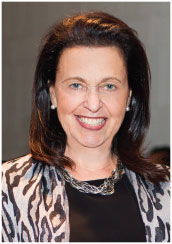Janina R. Galler, M.D. ’72
President, Einstein Alumni Association
Janina Galler fell in love with neurochemistry during high school in New Orleans. Needing to do a science project, she contacted Tulane Medical School and was placed in a lab studying the brain enzyme monoamine oxidase. Her research landed her Westinghouse Science Talent Search honors—an auspicious beginning for the child of two Holocaust survivors from Poland.
Today Dr. Galler is a leading authority on child malnutrition and brain and behavioral development. Among her many titles are professor of psychiatry at Harvard Medical School and psychiatrist in the Chester M. Pierce, M.D., Division of Global Psychiatry at the Massachusetts General Hospital. She served on the National Advisory Council of the Eunice Kennedy Shriver National Institute of Child Health and Human Development.
Dr. Galler is the founder and research director of the Barbados Nutrition Study. This longitudinal study of Barbadian children, started in 1973, examines the effects of childhood malnutrition over life spans and across generations.
Its major finding—the increased prevalence of attention and other deficits that continue into adulthood and can be found among healthy offspring of adults with histories of malnutrition—has helped shape public policy targeting underserved children in the United States and abroad.
She also directs a translational research program relating to preclinical and basic neuroscience studies, including epigenetics, of early malnutrition and its impact on brain and behavioral development.
Dr. Galler was born in Uppsala, Sweden, and immigrated to America with her parents as a child. She grew up in an observant Jewish home and graduated summa cum laude in two years from Sophie Newcomb College, “a small women’s college with no premed program at the time,” she recalls.
Having heard that Einstein welcomed observant Jewish students, she met with the dean of students and was accepted. “Einstein took a risk with me,” she says. “I was very young, female at a time when most medical students were male, and from the Deep South.”
“I had amazing mentors,” she notes. Chief among them were
Dominick P. Purpura, M.D.; Herbert Birch, M.D., Ph.D.; and
Isabelle Rapin, M.D. On her second day at Einstein, Dr. Birch, a professor of pediatrics and developmental psychology, invited her to join his lab, and she worked with him until his death in 1973. Her assignment: to establish animal models of malnutrition in young rats. After graduating, she completed her residency in psychiatry at Mass General and a fellowship in child psychiatry.
“Einstein has always been welcoming and inclusive, with a wonderful faculty that’s unusually supportive of its students,” she says. “It values ethics and the social-justice dimension of medicine as much as the clinical and research dimensions. Even in my era, the school helped students pursue their passions and give back to society. I developed the entire basis of my academic, clinical and research career there.” (Einstein is also where she met her future husband, classmate Burton D. Rabinowitz, M.D. ’72.)
A member of the Einstein Alumni Association board of governors since 2011, Dr. Galler became its president in 2015. She and her fellow board members are dedicated to helping Einstein students, strengthening the alumni network and supporting the College of Medicine through alumni programs and events.
Grateful for scholarships she received as a medical student, she’s committed to philanthropy and appreciates the many alumni who share that commitment. “We’re ready to partner with
Dean Spiegel and the
Board of Trustees on new ways to support the school and the transition to the ‘new Einstein,’” she says.

